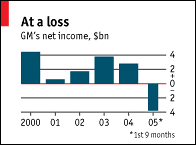Is the GM era drawing to a close?
 The recent issue of the Economist reports on the old Detroit carmaker General motors and the company's grave problems and essentially its struggle to stay alive. The obvious question is; what has gone wrong for the world's largest carmaker? Reading the material provided by the Economist it seems that this question might not be so easy to answer.
The recent issue of the Economist reports on the old Detroit carmaker General motors and the company's grave problems and essentially its struggle to stay alive. The obvious question is; what has gone wrong for the world's largest carmaker? Reading the material provided by the Economist it seems that this question might not be so easy to answer.
"Exactly how and why things have gone so wrong is a matter of debate." See Economist article here and the corresponding leader here; both walled for non-subscribers.
There is no doubt that General Motors is facing some serious problems at the moment. First off is the company's inherent inability to perform in as global player in the carmarket.
"Earnings have plunged, especially in its core North American market. The good ship GM scraped even more icebergs lately, the most recent being an announcement last week that it would have to restate earnings for 2001, due to improperly booked credits from suppliers."
 The Economist furthermore reports how the company has not managed to follow those trends in the global carinidustry on which other carmakers are now capitalising richly upon.
The Economist furthermore reports how the company has not managed to follow those trends in the global carinidustry on which other carmakers are now capitalising richly upon.
"GM refused to believe there would be enough demand to justify investment in petrol-electric hybrids. Yet again, it is now racing to catch up in a part of the market where the Japanese overwhelmingly dominate."
However, the GM also faces issues of which it does not have the powers to alter. Especially two issues are important here; firstly, the huge mandatory health bills which are to be paid to laidoff workers threaten GM's future existence although the unions have granted successions on this area.
"Mr Wagoner was able to put a positive spin on GM's bleak, third-quarter earnings report (losses are $3.8 billion so far this year) by announcing that the United Auto Workers Union (UAW) would grant unprecedented concessions, shaving $1 billion from the carmaker's mounting health-care bill. He has turned his attention to attacking so-called legacy costs. The huge cutbacks of the 1990s saddled GM with nearly three retirees for every active worker."
Secondly, the glooming situation at GM largest supplier and the possible future strike is something which could seriously damage GM's short term operations.
"UAW leaders are threatening to strike if Mr Miller goes ahead. A walkout could disrupt the entire motor industry, but as Delphi's biggest customer by far, GM would suffer the most."
Underlying this awful situation at GM's is the state of the global car industry where, as reported in september by the Economist, (walled for non-subscribers) more is not always better ...
"The strategy of consolidating behind the brands has not been entirely successful: indeed there is an inverse correlation between the number of brands a firm possesses and profitability. GM may still be the big beast of the industry, but it is no longer in any shape to gobble up others."
For another interesting view of GM's troubles; see this post by Thomas Paine
Perhaps it is really too late for GM to re-cap ?
If you want to dig further into the remnifications of the GM case go see this recent post by Mark Thoma. It deals with one of Paul Krugman's columns in NYT about the US health care system ("disputed" Wiki-article); Mark Thoma's post is a good read, so go read it!
See also wiki-article on Krugman.